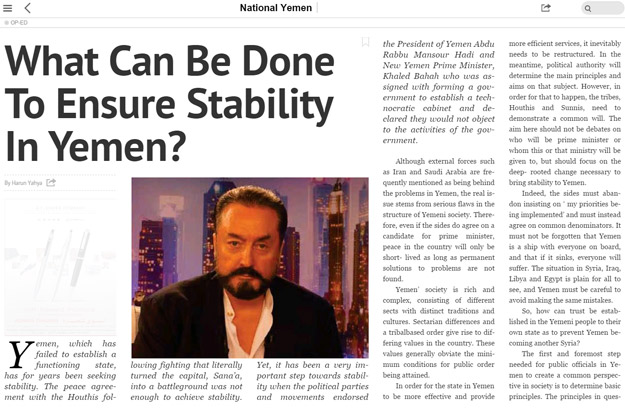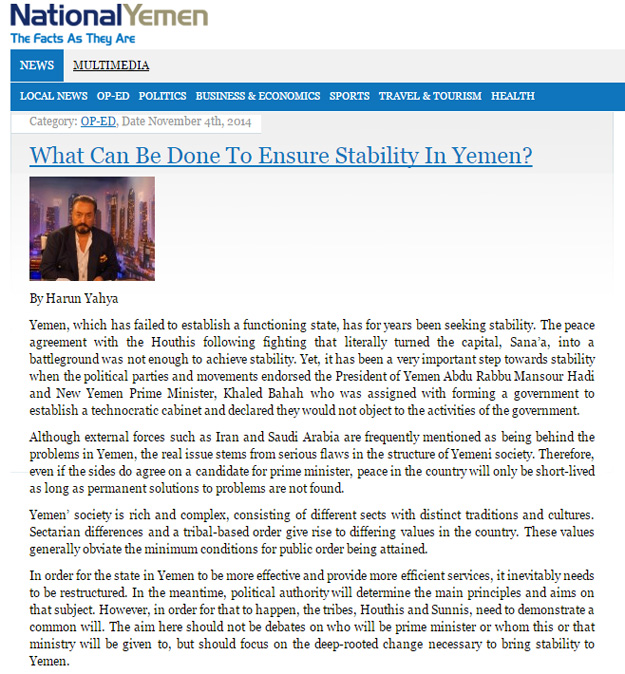

Yemen, which has failed to establish a functioning state, has for years been seeking stability. The peace agreement with the Houthis following fighting that literally turned the capital, Sana’a, into a battleground was not enough to achieve stability. Yet, it has been a very important step towards stability when the political parties and movements endorsed the President of Yemen Abdu Rabbu Mansour Hadi and New Yemen Prime Minister, Khaled Bahah who was assigned with forming a government to establish a technocratic cabinet and declared they would not object to the activities of the government.
Although external forces such as Iran and Saudi Arabia are frequently mentioned as being behind the problems in Yemen, the real issue stems from serious flaws in the structure of Yemeni society. Therefore, even if the sides do agree on a candidate for prime minister, peace in the country will only be short-lived as long as permanent solutions to problems are not found.
Yemen’ society is rich and complex, consisting of different sects with distinct traditions and cultures. Sectarian differences and a tribal-based order give rise to differing values in the country. These values generally obviate the minimum conditions for public order being attained.
In order for the state in Yemen to be more effective and provide more efficient services, it inevitably needs to be restructured. In the meantime, political authority will determine the main principles and aims on that subject. However, in order for that to happen, the tribes, Houthis and Sunnis, need to demonstrate a common will. The aim here should not be debates on who will be prime minister or whom this or that ministry will be given to, but should focus on the deep-rooted change necessary to bring stability to Yemen.
Indeed, the sides must abandon insisting on ‘my priorities being implemented’ and must instead agree on common denominators. It must not be forgotten that Yemen is a ship with everyone on board, and that if it sinks, everyone will suffer. The situation in Syria, Iraq, Libya and Egypt is plain for all to see, and Yemen must be careful to avoid making the same mistakes.
So, how can trust be established in the Yemeni people to their own state as to prevent Yemen becoming another Syria?
The first and foremost step needed for public officials in Yemen to create a common perspective in society is to determine basic principles. The principles in question must be advanced democracy, Islam and a Yemeni identity.
These principles must be explicitly set out by the state, and a more contemporary content must be added to the traditional perspective prevailing in society. The state must explain comprehensively in detail that all ethnic identities and political opinions can be maintained on the basis of democracy, and that democracy is indeed a part of Islam. For example, a Sunni must be told that Islam requires him to be friends with a Zayidi rather than his enemy with substantial evidence.
Be they Sunni or Zayidi, Muslims are brothers, and that brotherhood requires them to happily make sacrifices for and assist one another. For that reason, believers must have no qualms about helping other Muslims when they encounter difficulties on the path of God.
Every Muslim in fact wishes to help his brothers and to support those in need. This is a responsibility incumbent on all Muslims, Sunni or Zayidi. God reveals in the Qur’an that terrible strife and corruption will result when believers fail to help one another. God described believers as one another’s guardians due to the mutual solidarity between them. All Muslims will encounter difficulties of various kinds; however, the devotion and mutual aid between Muslims enable them to overcome these difficulties en masse.
God speaks in the Qur’an of Muslims assisting one another in the same way that deniers are united among themselves. Muslims falling out with one another and the friendship between them being compromised, at a time when deniers assist one another even though they do not believe they will be rewarded in Paradise, of course represents a source of great corruption. This subject is especially raised in the Qur’an:
“Those who are unbelievers are the friends and protectors of one another. If you do not act in this way there will be turmoil in the land and great corruption. Those who believe and have emigrated and struggled in the Way of God and those who have given refuge and help, they are the true believers. They will have forgiveness and generous provision.” (Qur’an, 8:73-74)
If a bond can be established between Houthis and Sunnis in Yemen, as the moral values of the Qur’an require, ‘impartiality’ will become the most basic principle within the state. State impartiality in the face of individuals, despite all their differences, will make every Yemeni truly ‘equal before the law’ and will enable them to access public services on an equitable basis.
The objectives of the restructuring to be performed for the sake of new stability and order in the Yemeni state may include:
1) The concept of citizenship must be redefined over and above political, sectarian or tribal identities, and it must be ensured that all Yemenis sign up to this.
2) Social integrity in Yemen must be maintained and strengthened. It must therefore be emphasized that Islam opposed division and is a unifying factor.
3) Balance between citizens must be observed in the provision of public services. State sanctions or incentives on the basis of sect or tribe must be avoided.
4) Citizens’ awareness on the subjects of public services and public authority must be restructured. Yemenis who enjoy greater public services will support the state more and avoid anything that might harm that state.
These four priorities will represent the basis of the establishment of public confidence. A state that instills trust in its own citizens will be able to maintain order in the streets and to provide uninterrupted public services.
Adnan Oktar's piece on National Yemen:
http://nationalyemen.com/2014/11/04/what-can-be-done-to-ensure-stability-in-yemen/


